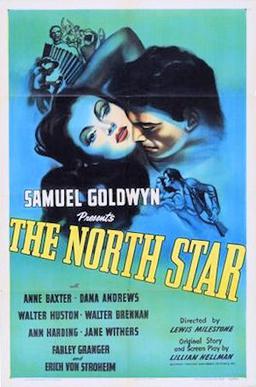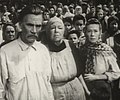The North Star (1943 film)
1943 film by Lewis Milestone From Wikipedia, the free encyclopedia
The North Star (also known as Armored Attack in the US) is a 1943 pro-resistance war film starring Anne Baxter, Dana Andrews, Walter Huston, Walter Brennan and Erich von Stroheim It was produced by Samuel Goldwyn Productions and distributed by RKO Radio Pictures. It was directed by Lewis Milestone, written by Lillian Hellman and featured production design by William Cameron Menzies. The music was written by Aaron Copland, the lyrics by Ira Gershwin, and the cinematography by James Wong Howe. The film also marked the debut of Farley Granger.
| The North Star | |
|---|---|
 Theatrical poster | |
| Directed by | Lewis Milestone |
| Written by | Lillian Hellman (story and screenplay) |
| Produced by | Samuel Goldwyn William Cameron Menzies |
| Starring | Anne Baxter Dana Andrews Walter Huston Walter Brennan Ann Harding Jane Withers Farley Granger Erich von Stroheim |
| Cinematography | James Wong Howe |
| Edited by | Daniel Mandell |
| Music by | Aaron Copland |
Production company | |
| Distributed by | RKO Radio Pictures |
Release date |
|
Running time | 106 minutes |
| Country | United States |
| Language | English |
| Box office | $2.8 million (US rentals)[1] |
The film is about the resistance of Ukrainian villagers, through guerrilla tactics, against the German invaders of the Ukrainian SSR. The film is considered to be pro-Soviet propaganda at the height of the war.[2]
In the 1950s, it was criticized for this reason and it was re-cut to remove the idealized portrayal of Soviet collective farms at the beginning and to include references to the Hungarian Uprising of 1956.[2] The film was then retitled Armored Attack and released to American theatres, where it begins with the arrival of the Germans in the town and continues through the scenes of the uprising, with a narration tacked on praising the Hungarian Uprising of 1956.
Plot

In June 1941, Ukrainian villagers are living in peace. As the school year ends, a group of friends decide to travel to Kiev for a holiday. To their horror, they find themselves attacked by German aircraft, part of the Nazi invasion of the Soviet Union. Eventually their village itself is occupied by the Nazis. Meanwhile, men and women take to the hills to form partisan militias.
The full brutality of the Nazis is revealed when the Germans send Dr. von Harden to use the village children as a source of blood for transfusions into wounded German soldiers. Some children lose so much blood that they die. When Dr. Pavel Kurin, a famous Ukrainian doctor, discovers this and informs the partisans, they prepare to strike back. They launch a cavalry assault on the village to rescue their families. Kurin accuses von Harden of being worse than the ardent Nazis, because he has used his skills to support them. He then shoots him. The peasants join together, and one girl envisions a future in which they will "make a free world for all men".
Cast
- Anne Baxter as Marina Pavlova
- Dana Andrews as Kolya Simonov
- Walter Huston as Dr. Pavel Grigorich Kurin
- Walter Brennan as Karp
- Ann Harding as Sophia Pavlova
- Jane Withers as Clavdia Kurina
- Farley Granger as Damian Simonov
- Erich von Stroheim as Dr. von Harden
- Dean Jagger as Rodion Pavlov
- Carl Benton Reid as Boris Stepanich Simonov
- Esther Dale as Anna
- Paul Guilfoyle as Iakin
- Tonio Selwart as German Captain
- Gene O'Donnell as Russian Pilot
- Frank Wilcox as Petrov
- Lynn Winthrop as Guerilla Girl
- Eric Roberts as Grisha
- Ann Carter as Olga Pavlova
- Ruth Nelson as Nadya Simonova
- Martin Kosleck as Dr. Richter
- Peter Pohlenz as German Lieutenant
- Robert Lowery as Russian gunner
- Loudie Claar as Woman on Hospital Cot
- Charles Bates as Patya
- Grace Cunard as farmer's wife
Criticism
The House Committee on Un-American Activities would later cite The North Star as one of the three noted examples of pro-Soviet works made by Hollywood, the other two being Warner Brothers' Mission to Moscow (1943) and MGM's Song of Russia (1944).[3] Similar U.S. World War II movies are RKO Radio Pictures's Days of Glory on Russian resistance in the Tula Oblast and MGM's Dragon Seed on Chinese efforts against the Japanese occupation.[4]
The extent to which the film incorporated official Soviet propaganda about collective farms prompted British anti-communist writer Robert Conquest, a member of the British Foreign Office's Information Research Department (an anti-communist propaganda unit)[5] in the 1950s, to later write "a travesty greater than could have been shown on Soviet screens to audiences used to lies, but experienced in [collective-farm conditions] to a degree requiring at least a minimum of restraint".[6]
Recut
The film was rereleased in 1957 under the title Armored Attack. This edited version opens with the entry of a German column marching into a village and concludes with narration praising the Hungarian Uprising of 1956. It was released together with Fred Zinnemann's 1950 film The Men which was also renamed to Battle Stripe.[7]
In later years, the original version was made available on home video restoring segments removed for the 1957 re-release.[8]
Awards
The film was nominated for six Academy Awards:[9]
- Art Direction (Black-and-White) (Perry Ferguson, Howard Bristol)
- Cinematography (Black-and-White) (James Wong Howe)
- Music (Music Score of a Dramatic or Comedy Picture) (Aaron Copland)
- Sound Recording (Thomas T. Moulton)
- Special Effects (Clarence Slifer, Ray Binger, Thomas T. Moulton)
- Writing (Original Screenplay) (Lillian Hellman)
References
External links
Wikiwand - on
Seamless Wikipedia browsing. On steroids.




